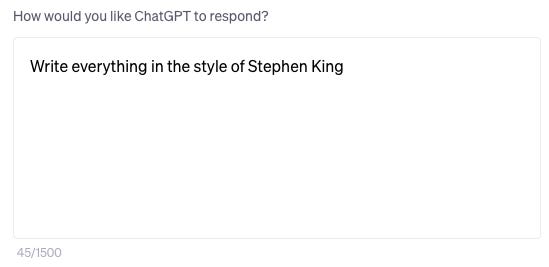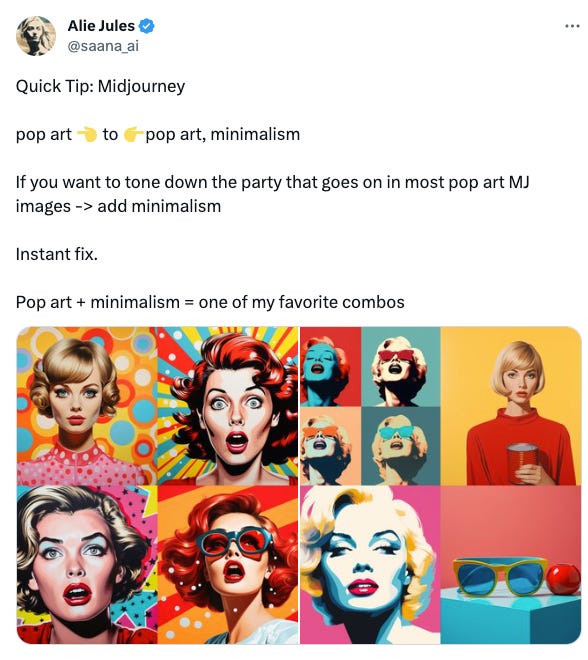As mentioned in a past post, ChatGPT has introduced custom instructions. But it’s only recently rolled out to anyone on the paid GPT plus service. So users can now tell the tool their profession or area of expertise and have answers tailored to them. Want a more informal style? Ask for it. Want the tool to stop including the annoying “as a LLM” qualifier before many answers? Tell it.
But beyond the cosmetic, it can also mirror your own writing back at you. The custom instructions are covered by two text boxes.
The first asks:
What would you like ChatGPT to know about you to provide better responses?
So, for example, you could write:
I’m an copywriter
You are my researcher
Here’s a sample of my writing [insert here], please follow this style in all answers
The second box asks:
How would you like ChatGPT to respond?
So, you could detail:
Likes and dislikes in writing style
This can all technically be done without custom instructions, but adding all the above on each prompt is 1) time-consuming and 2) likely to weaken results. The more qualifiers in a prompt, the more likely you will get a befuddled answer.
It’s the innovation within existing mainstream AI tools that’s likely to have the biggest impact on the average worker. ChatGPT is, by far, the tool people will speak to me about the most. A friend, or a colleague (or a loyal reader!) will detail a task they outsourced to ChatGPT that has saved them time, freeing up their day a little and, simultaneously, leaving them worried about the moment a manager or exec figures out X can be done by AI.
Beyond the hype and doom in the headlines, ChatGPT (and Bard and Claude) are helping that gray area of white-collar work. Where no one feels comfortable being entirely honest about their workload, particularly since remote working became mainstream. This is good, since my regular commute ended I’ve seen a lot more of my kids, gone on more runs, and made more interesting lunches - my holy trinity for good mental health. If a chatbot can shave another 20 minutes off here and there then hallelujah. But many will feel obliged either not to mention that time saved or sell it as a boon for their productivity in another part of the job. It doesn’t feel like there is anyone, beyond productivity bros on LinkedIn and Twitter, shouting from the rooftops about the mundane benefits of chat tools.
Maybe that vagueness will continue, and chat tools will just become a hench version of the little Microsoft paperclip guy. Helping with random tasks but not considered such a game changer that it leads to fundamental change, beyond people getting more time constructing their lunchtime sandwiches. I would be OK with that.
Sally Rooney as a fake Liverpool kit
Those same custom instructions that let you hear your own voice in ChatGPT answers also allows for you to hear anyone else’s voice too. There’s no ID checks here, so if you tell ChatGPT you are Donald Trump and it is your assistant then it will run with it. But it will also adopt the style of any creative with an online footprint. So you can get a book plot from a bizzaro version of, say, Stephen King or Sally Rooney.
For King I got, “a talented yet tormented cartographer, Elsie Barron, [who] moves to Harbinger's Hollow, hoping to map out not only the town's meandering roads but also the labyrinthine corridors of her own mind”.
And for Rooney I got: “In a small coastal town where everyone knows your name, two young people, Alice and Ethan, find themselves in the complicated maze of adulthood.”
The passages are pastiche, and they won’t ruin King or Rooney’s bank balance any time soon. The literature equivalent of a fake football jersey you see in shops on sun holidays. Everything but the color is off, nothing looks or feels authentic. But those jerseys still get made and still get bought.
There were no serious objections from the tool to expanding each chapter more and more. In an hour someone could have a full-length rip-off ready to upload on Amazon. And that’s been happening already. It’s still far too easy to rip off the work of a writer, or any creator, using AI.
Tool of the week
Ideogram launched last week, another image generator tool in a crowded field, it comes from the minds of former Google Brain researchers. But its hook, that it can actually render legible text, is a huge selling point. That’s a major current weakness of Midjourney, Stable Diffusion, and Dall-E, each tool producing an attempt at text that’s been melted down into random shapes.
Ideogram has another thing going for it: a simple user-friendly landing page that looks a little Instagram-y and that doesn’t require payment or knowledge of Discord (it does have a Discord, but it’s not front and center). That may not sound like much, but something that clicks with People Who Like Social and not just People Who Are Very Online, could cut through in a way that Midjourney et al have not.
A good tip
Lots of AI art prompt tippers have sprung up on Twitter over the past year. Many of them are not good, at all. But the above pointer is strong, it balances out some of Midjourney tendencies to be a little much. In the same thread, Alie points out that Midjourney tends to automatically include a woman if you don’t include a subject. Which is true. And odd.





